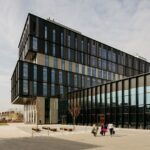At Plymouth, we are keen to demonstrate our KE impact. A recent evaluation identifying a wide range of KE activity across the University, delivered by highly motivated and well-supported staff who have developed sector expertise and networks.
-
Please provide a brief description of the KE project/ case study and why you believe it is considered good practice or innovative (and for whom). What challenge were you trying to achieve?
We have developed our approach to KE by emphasizing rewards and recognition for this work. This includes our promotional pathways for academics with routes through public engagement and championing innovation in enterprise and industry engagement. Applications include evidence on working with community groups, businesses, influencing policy and facilitating engagement in research. We also have the new Vice- Chancellor Awards which recognizes and celebrates all staff excellence and embraces Civic and Public engagement as well as Research and Impact Excellence. These Awards are open to all staff.
Vice-Chancellor Awards: University of Plymouth
We have also introduced a number of seed corn Awards within KE. They include our ‘Get Involved’ Awards where research ideas from the community are co-created with our academics. We also have Explore Awards to encourage staff to take part in new ways of undertaking public engagement and our R&D Solutions which support industrial partnerships.
We recognise and celebrate the wide range of KE activity we undertake. This includes encouraging staff to apply for external accreditation and awards and providing central resource to support the application process. We also celebrate achievements via our staff bulletin, our quarterly external KE newsletter, and press releases.
2. Where did the idea for the project/ programme come from? Was this related to a strategic objective? How did you secure senior buy in?
Promoting KE through our recognition and rewards programme strongly aligns with our 2030, A Future of Excellence University of Plymouth strategy and is supported by senior staff as part of our vision and strategy.
3. How did you ensure HR were on board, what were the benefits of engagement and did this make the process longer?
Our KE team regularly work closely with colleagues in HR and have engaged with them on the KEF and KEC previously. We ensure that KE at the University of Plymouth is informed by, and provide support for, University wide initiatives such as the Race Equality Charter and Athena Swann; this has led to a strong working relationship.
4. What impact/ outcome has this project/ activity had on your university? Students? Local economy? Staff? Other external parties, e.g. businesses.
The University of Plymouth has a strong focus on delivering real-world impact through knowledge exchange and innovation, and engages positively with businesses, communities and policy makers. This has been evident in the impact and measurement successes the university has achieved in terms of local growth and regeneration, public and community engagement, working with businesses and research partnerships.
The University’s activities generate £772m of output, which consisted of £492m through direct and secondary efforts, and £280m from student expenditure. The University generated 9,018 jobs in total, 0.3% of South West employment, 0.32% of regional GVA and 5% of city GVA.
5. How did you measure impact?
We use the SQW evaluation model for measuring and understanding impact for specific KE areas and also commissioned an Economic and Social Impact Report..
6. What types of resources were required to implement this project?
Our HR team facilitate the awards programme and we receive support from our Research and Innovation colleagues and academics across the University to help embed our approach to KE. Our colleagues in Marketing and Communications provide support with communication and photography.
7. Describe any challenges that you have had to overcome either before, during or after implementing this project?
The key challenge with this project, and many other forms of KE, is around communicating the outcomes, impacts and successes of the activity celebrated at these Awards events.
Externally we share lessons learned with the city and region via networks, specialist groups, awards and webinars. We encourage our staff to sit on regional policy groups and to work in partnership with a wide range of organisations. We also organise and host an annual civic event where we share our regional activity and impact with a wide range of stakeholders and encourage feedback and joint planning. Outside of these formal networks, we work closely with our marketing and communications team to ensure partners are kept informed via press releases, sharing of reports, web pages and social media.
8. How have you ensured there is a process for ownership and review into this activity? Noting this is leading to sharing good practice, how have you ensured there is a process for review and continued ownership into this activity?
Our rewards and recognition programme is embedded in the university and will be reviewed on an on-going basis. It forms part of our KEC and KEF and our annual action plans so will be owned as part of that approach.
9. What advice would you give others in trying to engage with hard-to-reach groups? Have you considered EDI within your strategy?
We have actively supported our approach to EDI in KE through the following:
- Developing a model of training community members in research to support the co-creation of research ideas and delivery. The training covers objectivity, ethics, methods and analysis.
- Offering training on public speaking for externals to encourage a more diverse group of speakers and role models.
- Recognising the time externals spend working with us, such as on panels, and paying appropriately. This has helped support the engagement of community organisations.
- Organising events off campus to support engagement and considering the venue and timings carefully to target people who may have less engagement with the University.
- Collect and reflect on monitoring data of those engaging. We have found postcode data particularly helpful to help plan neighborhood engagement.
Fossil exploration in a local community: University of Plymouth
10. Next steps?
The next few years will see more of a focus on evaluation and metrics and that includes how we engage, reward and incentivize our staff. We are looking at what HEBCIS might look like in the future and what will be measured. We envisage our next steps will include a focus on EDI, students as agents of KE as well as improved measurement around public engagement.











